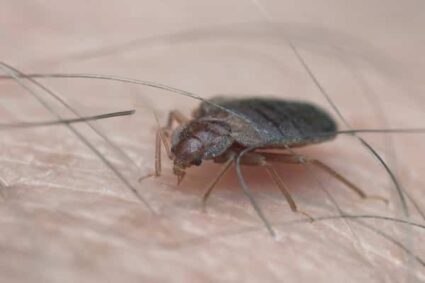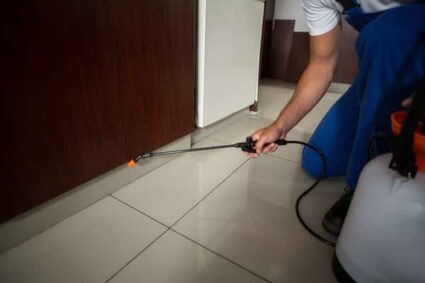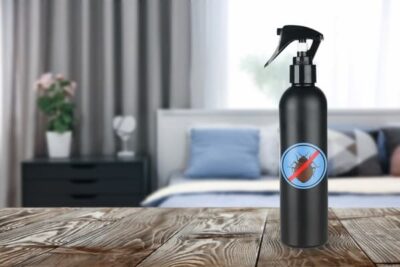Bed bugs are a frustrating parasite as they’re difficult to kill off. Not everybody has the budget to hire a professional pest control expert. Furthermore, many people are cautious about using chemical insecticides in their home, around children and pets. But can baking soda and vinegar kill bed bugs?
Baking soda doesn’t have any insecticidal properties. Making a difference to your bed bug infestation is unlikely. Vinegar, on the other hand, could kill bed bugs on contact, as long as it’s strong enough. However, it’s unlikely to eradicate an infestation on its own.
Let’s look into this topic in more detail. We’ll explore whether baking soda and vinegar have any insecticidal properties, and how you can use them. We’ll also recommend some alternatives.
Why Use Baking Soda or Vinegar for Bed Bugs?
Usually, when you’ve got a bed bug problem, the advice you’ll receive is “call an exterminator!” Exterminators use potent insecticides and extreme heat-treatment to rid a home of bed bugs.
While this may be the most sure-fire way of tackling an infestation of bed bugs, it isn’t realistic for everyone. Some people may choose not to call an exterminator because:
- They’re expensive. If you only have a small problem in one room, it could cost as little as $300. But for a large, highly-infested house, it could set you back up to $10,000. Though different exterminators will charge different amounts, it will be somewhere in this region. Simply put, a lot of people don’t have this kind of money.
- You may have to leave your home. Many companies require you to vacate the property while they carry out the work. This is because of the intensive nature of the extermination process. Fumigation and heat-treatment can render the home unlivable for a short while.
- There’s no guarantee it will work. A lot of bed bug exterminator companies only provide a 30-day guarantee. After that, if the bed bugs come back, you have to shell out the cash again. Many people aren’t willing to take that risk with such a large amount of money.
Of course, you can always purchase insecticides and do the work yourself. However, some people are hesitant to use such harsh chemicals in their home.
Many of them are toxic to pets, according to the ASPCA. Their Animal Poison Control Centre receives around 30,000 calls a year related to insecticides. The Centers for Disease Control has also warned about the dangers of bed bug pesticides, especially around children.
So, it’s no wonder that many people prefer to use natural methods for getting rid of bed bugs. But do baking soda and vinegar work? Let’s find out.
Does Baking Soda Kill Bed Bugs?
Baking soda (also called sodium bicarbonate) is a type of naturally occurring salt. Its chemical formula is NaHCO3. It resembles a fine, white powder, and has many household uses, ranging from cooking to cleaning.
Interestingly, according to the scientific journal Plant Disease, baking soda is antifungal. It can inhibit the growth of mold and other fungi. However, there is no scientific evidence demonstrating that it has insecticidal (bug-killing) properties. Some people claim it’s worked, but they provide no proof.
The theory behind baking soda as an insecticide appears to stem from the idea that it can dehydrate bed bugs, causing them to die. However, we couldn’t find any scientific evidence of that. It doesn’t appear on Wikipedia’s list of desiccants (drying agents). If it does absorb some moisture, it likely isn’t powerful enough to kill an insect.
There is also a theory that baking soda could be toxic to bed bugs if ingested. However, bed bugs purely feed on blood and do not drink water or eat other substances. Their mouthparts are specialized for piercing the skin and drawing blood. They would have no inclination, and would not be able to consume baking soda.

The verdict? As far as we’re concerned, baking soda cannot kill bed bugs. If you’d like to try using it, it probably won’t do your home any harm. However, we can’t vouch for its efficacy.
Does Vinegar Kill Bed Bugs on Contact?
So, baking soda probably won’t do any good. But what about vinegar? Is it similarly ineffective, or could it have some merit as an insecticide?
Vinegar is a mild acid with a pungent smell and sour taste. Its primary ingredients are water and acetic acid, an organic compound. There are many types of vinegar, some of which are used for cooking and others for cleaning. Most household vinegars are typically less than 5% acetic acid, according to Penn State University.
There is some research that demonstrates acetic acid’s potency as a pesticide. According to the United States Department of Agriculture, vinegar effectively kills many known weeds.
The higher the percentage of acetic acid, the more effective it is. According to Pesticide Action Network North America, acetic acid kills plants, microbes, and fungi. It’s also corrosive, toxic to aquatic life, and even to humans at high strengths.
So, taking the above into consideration, we can reasonably conclude that acetic acid would kill bed bugs. However, vinegar is not pure acetic acid – it’s a very watered-down version. It’s unlikely that household cooking vinegar would do much harm.
For killing bed bugs, the stronger the vinegar used, the more effective it will be. Search for a “cleaning” or “weed killing” vinegar, with a high percentage of acetic acid.
Some cleaning vinegars reach up to 30%. These are available to buy online and may be your best shot at killing bed bugs with vinegar.
Does Vinegar Repel Bed Bugs?
So, we’ve now established that vinegar probably does kill bed bugs on contact. For the most reliable results, you’re going to need vinegar with a high percentage of acetic acid.
It’s clear that in answer to the question “do bed bugs like vinegar?”, the answer is no. They’d much rather avoid coming into contact with it. But does vinegar deter bed bugs from coming back?
Because vinegar is a pungent acid, bed bugs will attempt to run away from areas where you’re applying it. This is a good thing and a bad thing.
On the plus side, it means that they’ll avoid any areas where they can detect vinegar. So, your mattress will remain bed bug-free as long as you continue to use vinegar on it.
However, while you’re using the vinegar, the bed bugs may run and hide somewhere out of reach. Once you stop using the vinegar, they’ll come back. As it’s a contact killer, the vinegar will only kill the bugs that it touches directly. It’s unlikely to get rid of an infestation completely.
What are the Disadvantages of Using Vinegar for Bed Bugs?
Now that you know how vinegar could help with your bed bug infestation, we’ll now look at the downsides. Unfortunately, vinegar isn’t a magic bullet – there are some disadvantages to it. Let’s go over what these are.
It Doesn’t Work on Eggs
Parasitical and other insect eggs are notoriously difficult to kill. According to a study in Insecticides Resistance, insect eggshells comprise multiple, almost impossible-to-penetrate layers. They work as a very effective barrier against insecticides.
Though strong vinegar may kill adult bed bugs, it’s not likely to have any effect on their eggs. A study by the Journal of Economic Entomology found that even some of the most effective chemical insecticides struggle to prevent bed bug eggs from hatching. As soon as the eggs hatch, you’ll have a new generation of bed bugs to deal with.
It’s Smelly
Vinegar is hardly a smell that you’d want lingering around your home. It’s a strong, acidic, offensive smell which easily permeates a room. The industrial-strength acetic acid that you’d need to kill bed bugs smells even stronger than cooking vinegar.
And of course, a few drops won’t solve the problem. You’d need to douse your furniture, carpets, mattress, and bed linens in vinegar for it to take any effect.
Not only is the smell strong and unbearable for many people, but it’s also long-lasting. It will take a long time to rid your home of the vinegar smell after you’re done.
It May Damage Furniture
Vinegar, as you know by now, is an acid. Though many people use vinegar to clean parts of their home – such as mirrors – it can damage other furnishings. Even low-strength or diluted vinegar can cause trouble.
As you’d be using highly-concentrated cleaning vinegar, the danger is even more substantial. Vinegar can damage wood, stone, ceramic, marble and granite. If you’re going to be dousing your home with it, be careful. Although it may get rid of bed bugs, it may cause lasting damage to your home. It may be best to leave the vinegar for beds, couches, and upholstery.
High-strength vinegar can also damage the skin if used neat (undiluted). You’d need to use adequate protection to ensure you don’t get any on yourself. Incidentally, some people do use vinegar for bed bug bites (though this is low-strength cooking vinegar, such as apple cider vinegar).
It Won’t Work for Large Infestations
Vinegar doesn’t have a residual effect on bed bugs. It only kills the bugs that directly come into contact with it. Once the vinegar evaporates away, what’s left won’t have any effect.
Simply being in the vicinity of vinegar isn’t going to kill a bed bug. Nor is walking across an area which was doused in vinegar a week ago. A bug that manages to escape the vinegar, and hides out somewhere safe, will continue to live and breed.
According to a report by Virginia Tech and Virginia State University, female bed bugs lay between 1-7 eggs per day and can lay them anywhere. Consequently, populations can double every 16 days.
For this reason, vinegar isn’t a viable solution for a large infestation. It’s too difficult to apply vinegar into all the tiny nooks and crannies of your house or apartment. If there’s somewhere bed bugs could hide, they’ll take advantage of it. They breed too quickly for vinegar to be your only weapon.
How to Make Homemade Bed Bug Spray with Vinegar
Even though vinegar may not be a perfect solution, it can control the bedbug population somewhat and is worth a try. If you’d like to try using vinegar for your bed bug problem, here’s how to go about it.
- First, acquire some high-strength cleaning vinegar. Remember, the higher the percentage of acetic acid, the more effective it will be. Try to find a 20% or 30% strength brand, if you can.
- Next, fill an empty spray bottle with the vinegar. Simple spray bottles are available at stores such as Dollar Tree, and also online. To start with, use 1 part vinegar to 2 parts water. If this isn’t effective, increase the amount of vinegar.
- Before spraying the affected item – such as the bed or couch – soak the area around it. Focus on and underneath baseboards, doors, and under furniture. Spray anywhere that the bed bugs may run and attempt to hide. Once the bugs smell the vinegar, they’ll attempt to get away. You want to make sure that if they try to run away, they’ll run into more vinegar. Leave no crack or crevice un-sprayed.
- Next, douse the infested furniture completely with the vinegar spray. Make sure you don’t leave any area of the mattress (or couch, or whatever you’re spraying) dry. Remember, the vinegar will only be effective if the bed bugs haven’t got anywhere to hide.
- Finally, repeat steps 3 and 4 on any other areas of your home that you believe bed bugs are living. This could include additional beds and couches, chairs, carpets and soft furnishings such as drapes.
Because it doesn’t kill bed bug eggs when these eggs hatch you’ll need to repeat your vinegar treatment. For the best results, spray your entire home at least once per week.
Remember to wear a respirator and eye goggles when working with high-strength vinegar. Also, be sure not to get any on your skin, as it could cause burns.
What Can I Use to Kill Bed Bugs Instead?
If you’re not sold on using vinegar or baking soda for your bed bug infestation, we don’t blame you. If you’ve tried it, but it hasn’t worked, that’s also not particularly surprising. After all, scientific evidence of their efficacy is severely lacking.
Baking soda likely doesn’t have any insecticidal properties. And though very strong vinegar might kill bed bugs on contact, it’s not enough to rid you of a large infestation.
However, that doesn’t mean that you need to turn to chemical insecticides. There are other natural methods of controlling bed bugs. Either alone, or alongside vinegar, you can try the following.

High Heat
Bed bugs don’t get on very well with heat. A study in the Journal of Economic Entomology found that exposing bed bugs to temperatures of 60 degrees Celsius (140 degrees Fahrenheit) killed them, at all stages of the life cycle.
They did this by washing infested bedding. Tumble-drying infested items on a hot cycle for at least 30 minutes had a similar effect. If you do this, make sure to keep your freshly washed and dried items away from the infestation afterward.
As well as washing your infested bed linens and clothes on a high heat, you can also steam-clean your mattress. If all else fails, have your house heat-treated for bed bugs. This is a more thorough treatment, involving heating your entire home to kill all bed bugs living there. You’ll have to call a professional to arrange this, though. It can also be quite expensive.
Rubbing Alcohol
Many people find rubbing alcohol (isopropyl alcohol) to be effective at killing bed bugs.
Like vinegar, this involves spraying the bugs and waiting for them to die. It’s another contact killer, meaning you’d have to target the bugs directly in order for it to have any effect. The stronger the alcohol, the better the results will be.
Unfortunately, like vinegar, it also isn’t that effective for large infestations. Not only that, but a study by Rutgers University in New Jersey found that rubbing alcohol is only about 50% effective. In their study, they sprayed bedbugs with rubbing alcohol, and about half were alive four days later.
Vacuuming
Something as simple as vacuuming can’t possibly be effective against a bed bug infestation, can it?
Surprisingly, research suggests that it is. A case study published in Professional Pest Manager found that vacuuming can “rapidly decrease insect numbers.”
Not only that, but high-power vacuum cleaners can also remove eggs. After vacuuming, make sure to remove the inner bag and seal it inside a plastic bag before throwing it away.
It’s usually a good idea to pair vacuuming with another treatment, such as heat treatment. Vacuum cleaners aren’t able to reach inside all the little cracks and crevices where the bugs may hide.
Diatomaceous Earth
Though you may not have heard of it, diatomaceous earth is a popular product for controlling bed bugs. It’s a naturally-occurring, soft sedimentary rock, made from fossilized sea creatures called diatoms. It’s non-toxic, though dangerous when inhaled.
According to a study in the Journal of Stored Products Research, diatomaceous earth is a known insecticide. It’s a desiccant, meaning it works by absorbing moisture and lipids (fats) from the outer shells of insects. This causes the insects to dehydrate and die.
Sprinkle diatomaceous earth in and around any areas where your bed bugs like to hide, including cracks and crevices. It can take over a week for the bed bugs to die once exposed to it. As it’s another contact killer, it’s best used in conjunction with other methods.
Tea Tree Oil
Tea tree oil is an essential oil that is completely natural and contains no harsh chemicals. It has a noted insecticide effect. Though there are no specific studies on its efficacy against bed bugs, a study in Parasitology Research found tea tree oil to be effective at killing head lice. As they are very similar parasitic creatures, it’s reasonable to assume that it would work similarly for bed bugs.
It works by killing lice on contact, like rubbing alcohol or vinegar. Spray tea tree oil directly onto the bed bugs for the best results. However, be aware that tea tree oil shouldn’t come into contact with skin if undiluted. Again, it’s best to combine tea tree oil with other methods, to ensure that the entire infestation is taken care of.
I Still Have Bed Bugs, What Do I Do?
Bed bugs are fast, clever and surprisingly resilient – they’re one of the most difficult parasites to get rid of. They tend to hide out in the most unreachable places (such as inside electrical outlets). Not to mention, their eggs are even tougher to kill than they are.
So, even when using all of the above methods, you may still find that they keep coming back. Even if only a few eggs survive your attempts, a new generation of parasites will hatch.
So, if you find yourself struggling to rid your home of the infestation, don’t hesitate to call a pest control expert. The longer you leave them to breed, the worse it will get.
Try to find an exterminator with a long guarantee, or a 100% success promise. That way, even if the bed bugs return, you can get your money back and try again.

